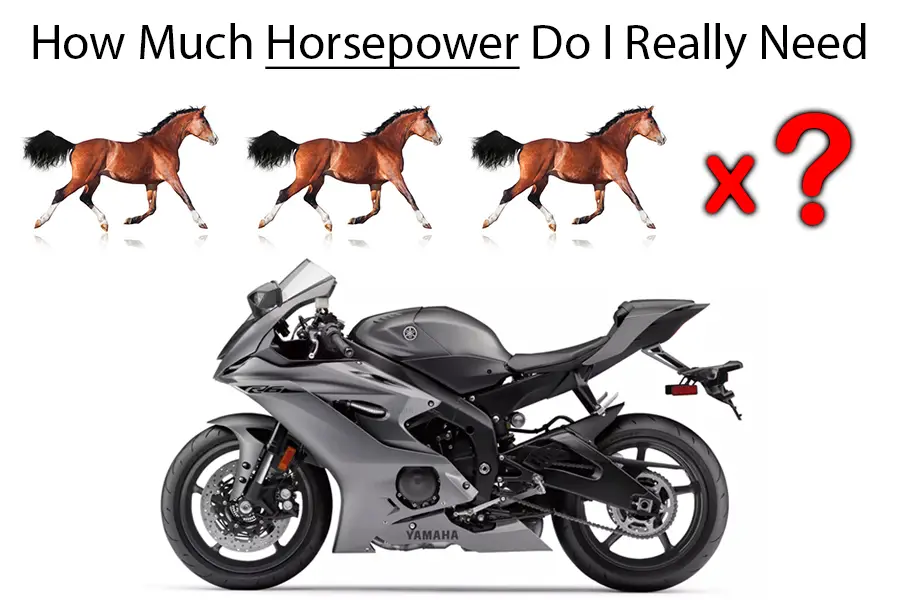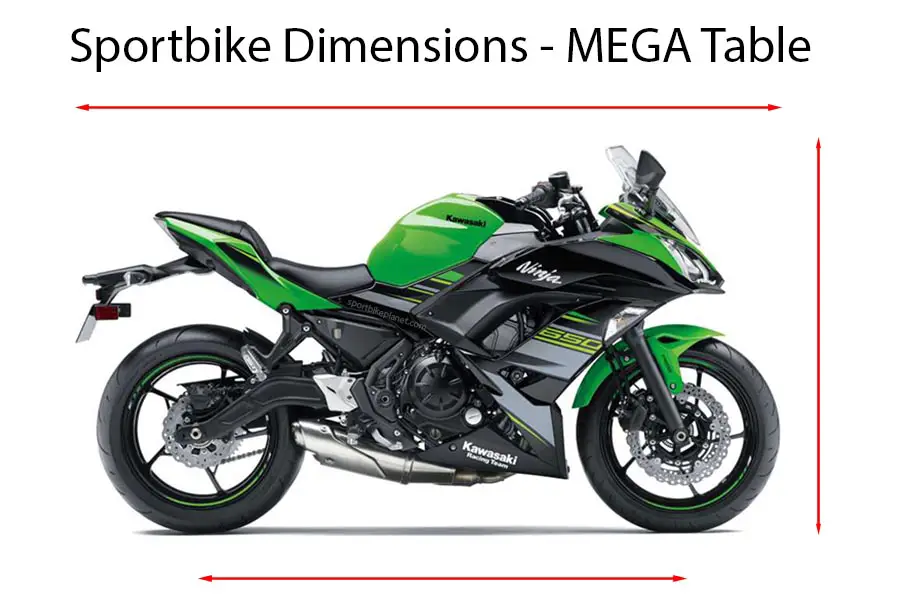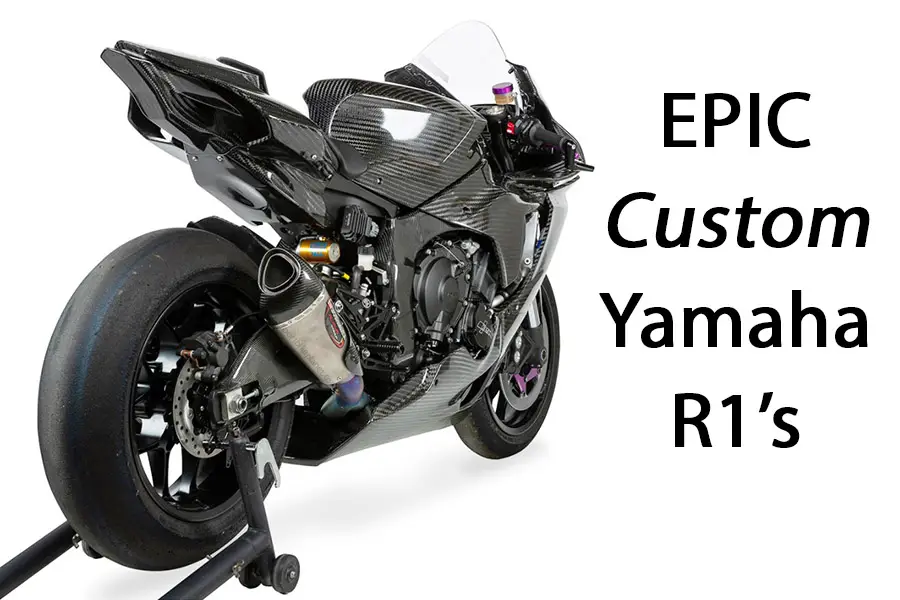For as long as motor-powered vehicles have been in existence, ‘how fast can it go?’ has been the question that has been top of mind ever since.
Motorcycles particularly are haunted by this premise as they are expected to go fast, have immense amounts of power relative to their weight and by rights you should have bare white knuckles on the handlebars from holding on.
However, how much horsepower your motorcycle actually needs for a given task vs how much horsepower you might want while keeping riding safe are two very different questions with two very different answers backed by different reasonings.
Let’s take a deeper dive into this question…
How Powerful Of A Motorcycle Do I Need?
For riding in traffic within speed limits a 12 horsepower 125cc motorcycle is all you need. Motorcycles with up to 50 horsepower, however, do make riding in suburban and highway traffic more comfortable and give you more oomph to safely overtake if required.
Ultimately, the fact is, that motorcycles really do not need a lot of horsepower as they are so light compared to cars.
As an example, a motorcycle like the Honda CBR300R pushes out 31 horsepower from its 286cc engine and that is a very competent motorcycle for navigating traffic and for moderately lengthy cruises.
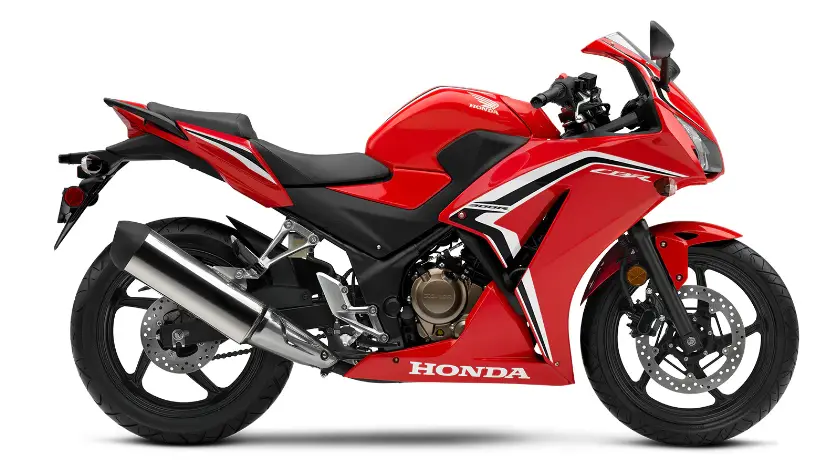
Of course there are very specific reasons why a motorcycle would benefit from more or less power…
Why You Would Want A More Power Motorcycle
- Motorcycle racing;
- Long distance riding including Highways;
- Touring motorcycles with lots of luggage;
Why You Would Want A Less Powerful Motorcycle
- Size and weight of the rider;
- New riders;
- Less horsepower equals more fun (yes, really!);
Let’s examine things a little further.
How Powerful Of A Motorcycle Should I Get?
You should get a motorcycle with horsepower that is low enough to be safe for your experience level and size, yet high enough to be safely enjoyable and enable you to cruise long distances comfortably or enjoy a track day occasionally.
Ultimately it largely depends on your experience level and what you personally want to get out of your riding experience.
Personally, I always refer back to ‘The Motorcycle Diaries’ where Ernesto Che Guevara, Alberto Granado and a dog rode a Norton 500cc with around 14 horsepower across South America.
It was the ultimate adventure and has certainly shaped the way I look at what motorcycles are capable of, with myself opting for small capacity bikes every day of the week over big bikes.
Although, these days I do have a burning need for a Ducati 916, but that is another story.
When you are thinking about the horsepower you need, you need to first think about your riding needs, what you are hoping to do on your bike and where you are planning to go?
Your Size And Weight Relative To Motorcycle Horsepower
Height, weight, and strength, all play into the motorcycle you should choose.
Some bikes are very tall, others have lower seat heights, some are extremely heavy and others very lightweight.
This plays into how much horsepower you need because if you are a heavier rider on a lightweight motorcycle this could impact the final power output from the engine – i.e. power to weight ratio.
Therefore, you might consider shooting for a bike that has a bit more power to compensate for this.
Equally if you are a shorter rider on a tall bike, it might serve you well depending on your experience to opt for a bike with less power so that you have plenty of control at slower speeds.
A throttle that unleashes power like a demon at stop lights when you are propped up on just one leg is going to leave you a little unbalanced.
RELATED: The Best Sportbike Size For Your Height
Commuting And Motorcycle Horsepower
If you are riding all-year and use your motorcycle as a means to get to work, then you need to think about your journey and what kind of roads it entails.
Are you mainly riding on back roads, single lanes? Or is there a good portion of highway riding involved at speed?
If you are riding on mainly single lanes and in the city a lightweight-middleweight motorcycle is going to fulfil all your needs and be fuel efficient.
The Yamaha YZF-R3 might be a perfect choice for this purpose with a punchy 321cc engine producing 50 horsepower.
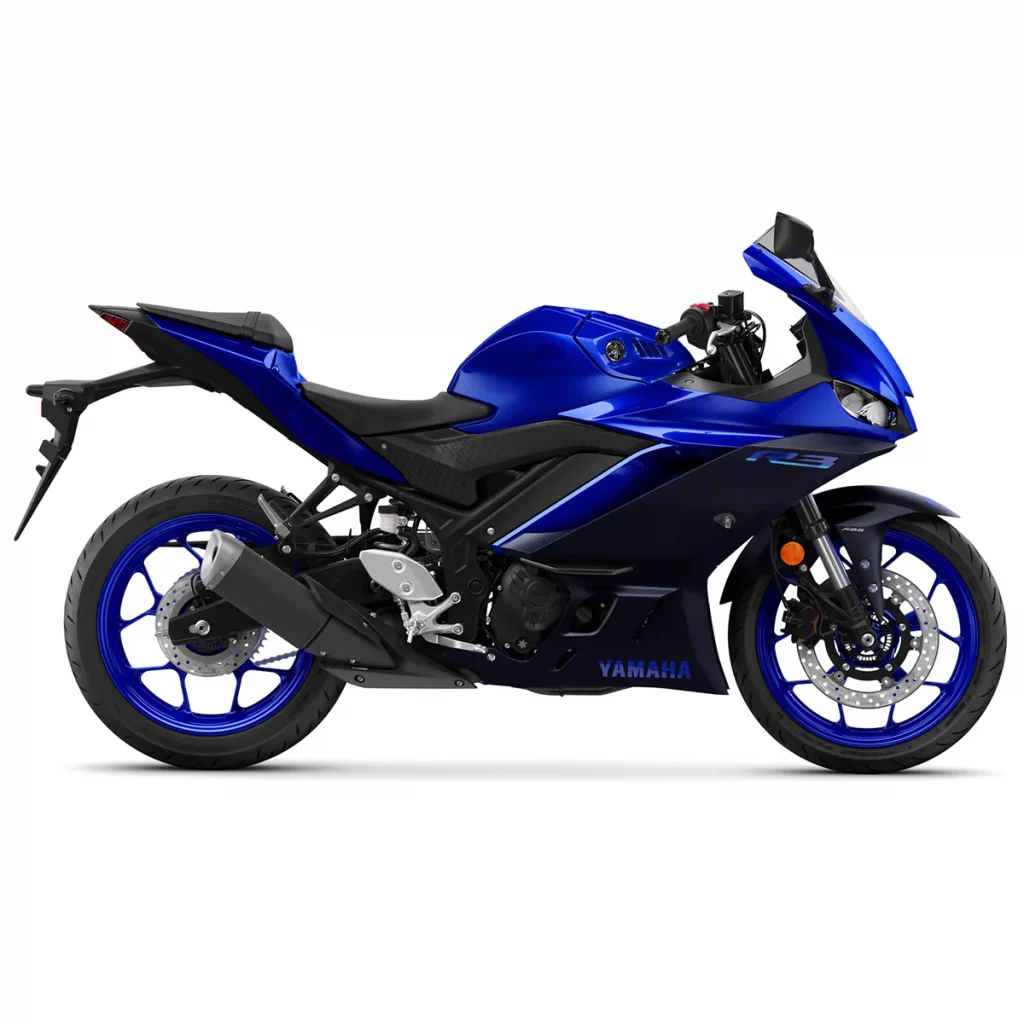
However, if you have more highway riding involved in your commute and longer distances and you’re set on a sportsbike you could look at the Yamaha R6, which gives you 116 horsepower to tap into.
The benefit isn’t so much the masses of power you then have to utilise for top peak performance, but the way the powerband is spread will make cruising at 70mph for long periods of time easier and put less strain on your engine.
Weekend Leisure Riding And Motorcycle Horsepower
Where things get a little fuzzy again is if you just ride your motorcycle for pleasure and don’t need to use it as a utility vehicle.
Are you content with cruising around down to the beach, up in the mountains taking in the scenery as you go? Or does your Sunday ride consist of you hitting the twisties to blow the cobwebs off and unleash your inner Rossi?
If you like to moonlight as a racer on the weekend and maybe throw in a track day occasionally then you’ll want a motorcycle with higher horsepower to match those needs.
At that point you are likely going to look at a litre bike (1000cc) and with sportbikes there is a whole world to choose from, whether the Yamaha R1 is your thing, the CBR1000RR, or the latest Ducati Panigale.
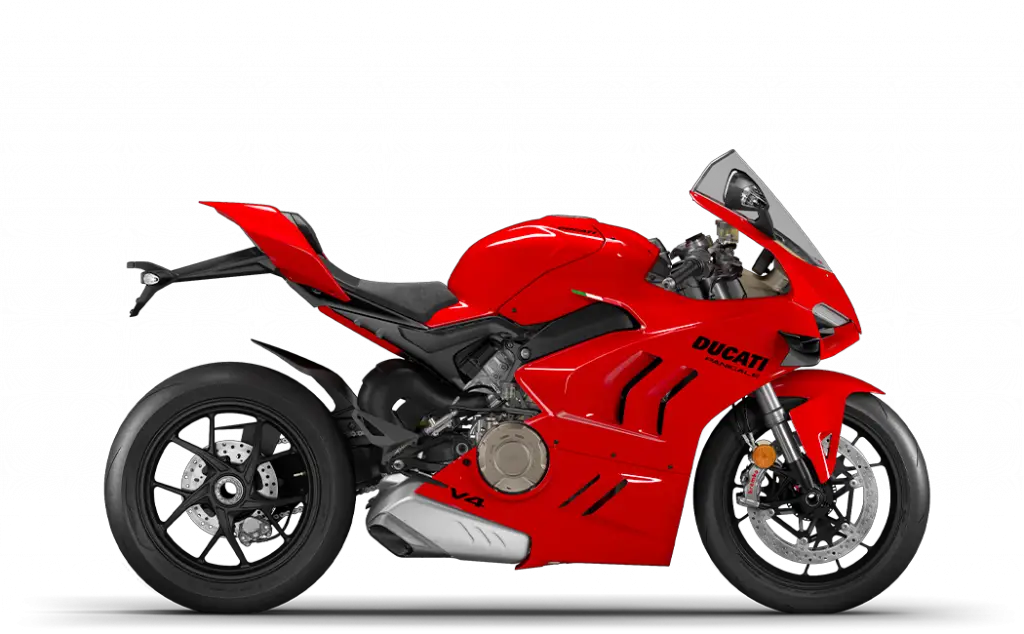
Touring And Motorcycle Horsepower
The best approach for motorcycle touring is to ensure you have a sufficiently powerful bike that carries you and your luggage comfortably without power being impacted too much by the extra weight, and you should always consider the journey in terms of the roads you will be riding on.
Sports tourers make up a big segment of the sportbike market and just like everything else they come in a range of capacities to meet different needs.
I have toured on a Mutt 125cc Motorcycle and done 500 miles plus weekend camping trips fully loaded with no issues except it was a little slow, but I had great fun as everything was slowed down so I could take it all in.
On the flip side I am sure a Ninja 650 with its 67 horsepower would have made the trip much more comfortable and it would have eaten up the fast roads.
If I was riding with a passenger and full luggage across country the Ninja 1000 SX would probably be even more suitable.
Motorcycle Racing And Horsepower Requirements
When it comes to motorcycle racing and horsepower it isn’t all that complicated. There are races for all capacities and these are limited by power output of the bike.
For example a 500cc motorcycle cannot compete in a 1000cc race category. This has been the case since motorcycle racing first got started.
What this means therefore if you want to compete in amateur racing you just need to find your category that you are most comfortable with and have experience with.
You can race 125’s, 300’s, 600’s, 1000cc bikes, everything in between and beyond. Road racing, track racing, drag racing, off-road races etc.
There is a race for every bike and every rider, the power output in these races is less important than the skill of the rider.
One thing to note is that manufacturers often produce sportbikes more suited to the road and supersports which are more race defined.
While they share similarities and are often derived from the manufacturers’ flagship race bikes, they do differ in powerband, ergonomics and layout etc.
RELATED: Sportbikes Vs Supersport Bikes, Differences And Best Choice
Riding Experience and New Riders
Choosing a sportbike with masses of horsepower when you lack riding experience or are a new rider altogether is simply asking for trouble.
You need to ignore peer pressure and the comments that any sportbike below a 600cc isn’t a real motorcycle, as they are just ridiculous and put riders in direct danger.
Any motorcycle is a powerful machine regardless of its spec sheet. You are very vulnerable sitting on top of an engine between two wheels and you are reliant on your own skill to control this mechanical machine.
A 125cc 12 horsepower motorcycle can reach speeds of 70mph, an accident at 30mph let alone 70mph is not a fun or pretty experience.
Therefore you should select a motorcycle that you know you are in control of, confident when riding and are not going to be tempted by the power that is available at the pull of a throttle.
We have some good beginner sportbike options that you can check out in our post here.
RELATED: The Best Sportbike For Beginners, Helpful Definitive Guide
With that said, riding a 500cc plus motorcycle with 50 horsepower is much easier and smoother than riding a 12 horsepower 125cc or 21 horsepower 250cc bike.
The power delivery tends to be smoother, gear changes are less and you are left with more time to focus on the road ahead.
Having around 50 horsepower available to you as a newer rider means you can grow into riding and really learn the craft without getting bored due to speed restrictions of a smaller engine.
Better To Chase The Red Line On A Slow Bike Than A Fast One
I am a firm believer of the philosophy that you can have more fun on a slow bike than a fast one and I know for a fact I am not alone in this premise.
When you are riding a motorcycle where chasing the red line is actually attainable at reasonable speeds there is a sense of fulfilment that you just can’t get on a 100 horsepower bike.
Horsepower isn’t everything, the riding experience is what makes motorcycling so incredible, the freedom, the exposure to the elements, wind in your face and connection with the road is what makes motorcycling fun.
If you have a motorcycle with 100 horsepower, or 228 horsepower in the case of the Kawasaki H2, you are never going to utilise all of that power on the road, ever.
Sure it’s amazing, an incredible feat and an engineering marvel however, only the very best professional riders are going to be able to make the most of that power and that will be on a track.
How To Choose The Right Motorcycle Based On Horsepower?
We have a very good guide that explains how to choose the right motorcycle for you based on engine size, the tips in this will help you choose the right bike based on the power output, so check that post out here.
Final Thoughts
There is not one cookie cutter clear answer for how much power a motorcycle needs as it is different for every rider.
By considering everything we have covered in this article, from your size to your riding needs and by truly analysing what you need out of your motorcycle you will be able to choose the right amount of power for you.
The key is to remember is that the power you need from a motorcycle is very different from what you are capable of utilising fully and also different from the power you want to be able to tell your mates your bike has.

